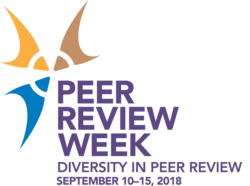Peer review week
Posted on September 10, 2018 by Nicola Davies
As publishers, learned professions and universities celebrate Peer Review Week, we look at why peer review is important to the Microbiology Society, what our authors and reviewers say about our peer review process, and what we are doing to recognise our reviewers.
Peer review at the Microbiology Society
We believe that peer review plays an essential role in maintaining scientific quality.
All articles submitted to Society journals are subject to a rigorous peer review process. We operate a single-blind review process, in which referees know the identity of the authors but authors do not know the identity of the referees. We are also a member of the Committee on Publication Ethics (COPE) and promote the COPE International Standards for responsible research publication for authors and Editors.

So, why are we telling you this?
In the age of “predatory publishers” it is more important than ever that authors and readers alike can trust the journals they’re publishing in and the research they’re reading. Predatory publishers are commercial organisations that claim to be Open Access publishers, and charge authors for publication. These papers published in these journals do not go through proper peer review or have suitable Editorial Boards.
It is important that scientific papers go through rigorous, academic review before publication to ensure the correct information is published. If incorrect information is published, this can cause panic and affect public trust in scientific research.
What does the Society to ensure that only high-quality research papers are published?
On submission the article is assigned to an editor – all our editors are practicing researchers and are experts in their field – who make an initial assessment of the manuscript. At this stage a manuscript can be rejected if the editor does not think the manuscript is suitable for the journal. This is known as a pre-screen reject. If the manuscript passes the initial assessment, it is then sent for formal peer review.
Generally, our editors require at least two reviews to make a decision and can select reviewers from our database. Our reviewer database includes researchers from all over the world, covering all aspects of microbiology. In selecting reviewers, the editor will generally look for someone who is active in the relevant field and has a good publishing record. Reviewers are asked to comment on quality, scientific rigor, novelty, and significance to the field. Sometimes our editors may approach a third reviewer if they are unable to make a decision based on the two reports they have received.
The editor then evaluates the reviews and makes a decision; this may be reject, accept or the editor may ask authors to make changes to the manuscript based on reviewers’ comments. If sufficient changes are needed the editor may then send the revised manuscript back to one or more of the original reviewers and will then make a decision based on their report(s).
Because peer review plays such a crucial role in publishing, it is important that our process serves the needs of our community, and here at the Society we have been asking our authors and referees what they think about what we do.
Listening to the community
All submitting authors and referees have the opportunity to feedback on their experience of the Society’s peer review procedure. Pleasingly we have received lots of positive feedback with 91% of authors rating our process as excellent or good and 90% of reviewers saying they had an excellent or good experience.*
“A very efficient review and handling process!”
“The reviewers provided constructive comments which significantly improved our manuscript”.
“The editor was very helpful. The reviewers' comments were constructive.”
However, we are always keen to improve and will be taking any comments onboard! One example of how we are listening to feedback, is how we recognise our reviewers:
Recognising our reviewers
Last year we asked our reviewers how they would like the Society to recognise their efforts. The most popular responses were reviewer certificates, acknowledgement on the journals’ platform and discount on open access article processing charges. We are therefore delighted to announce that from 2019 we will be introducing a 15% discount code for Open Access articles to all qualifying reviewers. Reviewers will also have the option to be included in our annual list of reviewers.
Our top 10% of reviewers (in terms of numbers of reviews returned per year) will receive a certificate recognising their contribution, including a 30% discount code for an Open Access article as well as the option of being named in a list of those who have made an Outstanding Review Contribution.
If you would like to know more about our publishing process or are interested in submitting to one of our journals visit microbiologyresearch.org. We’ll also be hosting sessions on ‘Research and publishing ethics’ and ‘Essential skills: peer review’ at the Society’s Annual Conference, taking place in Belfast 08-11 April 2019.
*Data taken from responses received 4 July and 28 August 2018; 349 author respondents and 265 reviewer respondents.

